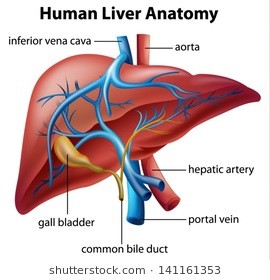
Diagnosed with Cancer? Your two greatest challenges are understanding cancer and understanding possible side effects from chemo and radiation. Knowledge is Power!
Learn about conventional, complementary, and integrative therapies.
Dealing with treatment side effects? Learn about evidence-based therapies to alleviate your symptoms.
Click the orange button to the right to learn more.
Sorafenib for Liver Cancer- Integrate?

Sorafenib is a multikinase inhibitor used for the treatment of uHCC 10 Two Phase III studies (SHARP and Asia-Pacific) demonstrated significant improvements in overall survival in Hepatocellular Carcinoma patients…”
Sorafenib has been shown to inhibit heptocellular (liver) cancer. Sorafenib inhibits angiogenesis. My experience as a long-term survivor of an incurable cancer called multiple myeloma, is that conventional, FDA approved chemotherapy is expensive and caused short and long-term side effects. Research indicates that evidence-based integrative therapies can enhance the efficacy of conventional chemo while reducing the toxicity and side effects.
- Sorafenib works with curcumin-
- Sorafenib works with resveratrol.
- Quercetin has been shown to reduce Sorafenib resistance.
What is Sorafenib?
Sorafenib is a targeted therapy used in the treatment of advanced renal cell carcinoma (RCC), which is the most common type of kidney cancer in adults. Like any medical intervention, Sorafenib has both risks and potential benefits. It’s important to note that the decision to use Sorafenib or any other chemotherapy agent should be made in consultation with a healthcare professional who can assess the individual patient’s condition and medical history. Here are some general risks and benefits associated with Sorafenib for kidney cancer:
Benefits:
- Tumor Shrinkage: Sorafenib is designed to inhibit the growth of cancer cells by targeting specific molecular pathways involved in the development and progression of cancer. In some cases, this may lead to a reduction in tumor size.
- Prolonged Progression-Free Survival: Sorafenib has been shown in clinical trials to extend the time before the cancer progresses, providing patients with a period of disease control.
- Improved Quality of Life: By slowing the progression of the disease, Sorafenib may help improve symptoms associated with advanced kidney cancer, such as pain and fatigue, thereby enhancing the patient’s quality of life.
Risks:
- Adverse Effects: Sorafenib can cause a range of side effects, including fatigue, diarrhea, hand-foot skin reaction, rash, hypertension, and gastrointestinal symptoms. These side effects can impact the patient’s well-being and may require dose adjustments or additional supportive care.
- Hypertension: Sorafenib can lead to increased blood pressure. Regular monitoring of blood pressure is necessary, and antihypertensive medications may be required to manage elevated blood pressure.
- Cardiac Effects: Some patients may experience cardiac toxicity, including heart failure. Close monitoring of cardiac function is often recommended during Sorafenib treatment.
- Drug Interactions: Sorafenib can interact with other medications, potentially affecting their efficacy or increasing the risk of side effects. It’s important for healthcare providers to be aware of all medications a patient is taking.
- Liver Toxicity: Sorafenib can cause liver function abnormalities. Regular monitoring of liver function is essential during treatment.
- Bleeding: Sorafenib may increase the risk of bleeding, especially in patients with pre-existing bleeding disorders or those taking anticoagulant medications.
- Impaired Wound Healing: Sorafenib may impair wound healing, and surgical procedures may need to be postponed during treatment.
Integrating chemotherapy (Sorafenib) with evidence-based non-conventional therapies such as curcumin, resveratrol and quercetin is not an FDA approved standard-of-care therapy approach. Don’t be surprised if your oncologist disagrees with this therapy plan.
In my experience, cancer patients and survivors must utilize the best of both conventional and evidence-based non-conventional therapies in order to live their best, longest life.
Have you been diagnosed with liver cancer? What stage? Let me know if you have any questions-
David.PeopleBeatingCancer@gmail.com.
Thank you,
David Emerson
- Cancer Survivor
- Cancer Coach
- Director PeopleBeatingCancer
Recommended Reading:
Anti-angiogenesis in hepatocellular carcinoma treatment: Current evidence and future perspectives
“Hepatocellular carcinoma (HCC) is among the most common cancer diseases worldwide.
In 2007, sorafenib, a multi-tyrosine kinase and angiogenesis inhibitor, was approved as the first systemic treatment for advanced stage HCC.
Other active targeted compounds, either inhibitors of angiogenesis and/or growth factors, are currently being investigated in numerous clinical trials.
Over the last 12 mo, several retrospective or prospective cohort studies combining TACE and sorafenib have been published. Nevertheless, robust results of the efficacy and tolerability of such combination strategies as proven by randomized, controlled trials are awaited in the next two years…”
GIDEON (Global Investigation of therapeutic DEcisions in hepatocellular carcinoma and Of its treatment with sorafeNib): second interim analysis
“Patients with unresectable HCC, for whom the decision to treat with sorafenib, based on the approved label and prescribing guidelines, had been taken by their physician…
Background
Hepatocellular carcinoma (HCC) is now the third leading cause of cancer-related death and the fifth most common malignancy in men; the seventh in women 1,2.
The major risk factors for HCC include
- chronic hepatitis C and hepatitis B
- viral infections,
- as well as alcohol consumption,
- non-alcoholic steatohepatitis a
- nd diabetes 3,4.
The vast majority (70–90%) of HCC cases occur in the context of liver cirrhosis 5, and consequently many patients present with hepatic dysfunction and experience a high rate of comorbidity. HCC is therefore a heterogeneous disease in terms of aetiology as well as clinical presentation and behaviour, thus presenting challenges for disease management 6…
Sorafenib is a multikinase inhibitor used for the treatment of uHCC 10. Two Phase III studies (SHARP and Asia-Pacific) demonstrated significant improvements in overall survival in uHCC patients, the majority of whom had Child-Pugh A 11,12, and sorafenib is suggested as first-line therapy in HCC patients with advanced-stage disease 13…
Patient demographics and disease characteristics were generally similar between patients receiving an initial sorafenib dose of 400 or 800 mg.
Angiogenesis inhibitor
“An angiogenesis inhibitor is a substance that inhibits the growth of new blood vessels (angiogenesis). Some angiogenesis inhibitors are endogenous and a normal part of the body’s control and others are obtained exogenously through pharmaceutical drugs or diet…”


